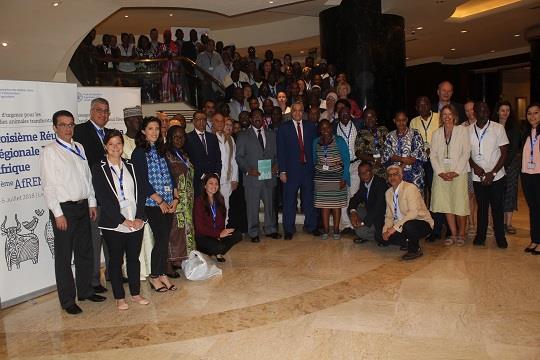FAO organizes its third Africa ECTAD regional meeting in Egypt

ECTAD representatives from more than 16 FAO country offices.
July 5, 2018, Cairo, Egypt – The Food and Agriculture Organization of the United Nations (FAO), Emergency Centre for Transboundary Animal Diseases (ECTAD) Programme held its 3rd Africa-wide regional meeting in Cairo, Egypt from 2 to 5 July.
More than 90 ECTAD staff representing 16 country offices where the ECTAD program is established, as well as staff from FAO Headquarters, the Regional Office for Africa and the Regional Office for the Near East and North Africa attended the event.
The meeting focused on discussing and defining future areas of work for ECTAD and considered strategies for diversifying and enhancing donor funds.
The meeting predominantly focused on addressing the challenges of avian influenza (AI), antimicrobials resistance (AMR) and animal health capacity development all of which are considered as major priorities for improved food and health security. The meeting also devoted some time to reviewing major achievements and challenges.
“AfREM meetings represent a forum to review the planning and implementation of projects, fine-tune work plans, and discuss major achievements, opportunities and challenges. By building capacity to prevent, detect and respond to disease emergence, FAO is reducing the impact of zoonoses on livelihoods, and helps to stop emergence and spread of potential epidemics and pandemics, at the source” said Abdessalam Ould Ahmed, FAO Assistant Director General and Regional Representative for NENA in his speech.
“FAO works with local and global partners with the ultimate goal of eliminating poverty and hunger, in this regards our work is closely linked with national governments, specialized agencies, regional economic communities, international research institutes, FAO, OIE and WHO reference laboratories, in order to build national and regional capacities to reduce the impact of infectious diseases on public health, improve food security and nutrition and support sustainable development” Ould Ahmed added.
“The specific objectives of the 3rd AfREM were to a) identify major achievements, good practices, success stories and implementation challenges, b) identify future areas of work (GEN2, post-September 2019) based on different funding scenarios, c) define approaches for mobilizing resources and d) define the process for finalizing EPT-2/GHSA workplans for the October 2108/September 2019 financial year,” said Subhash Morzaria, global coordinator of the FAO component of the USAID funded EPT2/GHSA programs.
The meeting was broadly divided into sharing of the progress and challenges of each sub-region in implementing the key components of the EPT-2 and GHSA Programme, developing a shared vision and mission for GEN2 (post-EPT-2) programme and identifying key areas of work and addressing internal communication and operation challenges to improve efficiency in implementation the ECTAD Programme
The meeting agenda was designed to allow full participation of all the teams representing both the technical and operations components of the ECTAD programme in order to ensure common understanding of the issues, improved coordination and enhanced team spirit.
About ECTAD in Africa
The Emergency Centre for Transboundary Animal Diseases (ECTAD) was established in 2004 as a unique partnership between the technical (AGA) and operational (TCE) Divisions of FAO. The ECTAD Programme in Africa was launched in 2006 following the introduction of highly pathogenic avian influenza HPAI in Nigeria in West Africa, and Egypt in North Africa.
FAO has made extraordinary efforts to establish new ECTAD Country Units in several sub-regions that include East Africa (EA), Near East and North Africa (NENA), and West and Central Africa (WCA). In Africa, ECTAD country units have been established in: Burkina Faso, Cameron, Democratic Republic of Congo, Egypt, Ethiopia, Ghana, Guinea, Ivory Coast, Kenya, Liberia, Mali, Sierra Leone, Senegal, Tanzania and Uganda.
